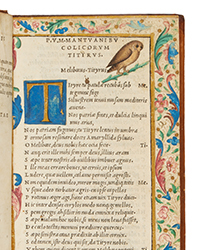David M. Lesser Fine Antiquarian Books has issued their Catalogue 209 of Rare Americana. They're all here, heroes and scoundrels, Presidents and murderers. This is America and Americans mostly from the 19th century. If you read all 209 of David Lesser's catalogues, you would probably know everything there is to know about America's past. Each catalogue would provide another slice of its life. Here is the latest.
On the chilly night of November 22, 1868, the servant girl of Mrs. Mary E. Hill returned home from a church service. Mrs. Hill had inherited a healthy sum of money from her successful businessman husband. Living with her was her daughter and son-in-law, Camilla and George Twitchell. George Twitchell had had two failed business ventures, leading to the couple being out of funds. However, they now lived reasonably well on his mother-in-law's money. That night, the servant girl discovered Mrs. Hill's body outside, beneath a window. Initially it looked like she fell, or was perhaps pushed. Further investigation revealed she had been beaten with a poker and dumped out the window. Suspicion turned to the Twitchells, and circumstantial evidence such as blood on clothing led authorities to put the pair on trial for murder. George claimed it must have been a burglar because Mrs. Hill supposedly carried a couple thousand dollars on her person, but it seemed unlikely that an intruding thief would have bothered to throw her body out of a window. It looked like a cover-up. Camilla was tried first and acquitted. George was not so fortunate. It took the jury all of 13 minutes to reach their verdict. He was sentenced to hang. He delayed the hanging through appeals, all the way to the Supreme Court, but all were denied. Five days before the scheduled execution, George claimed it was his wife who murdered her mother. Authorities were unconvinced. Camilla could not have been tried for murder now since she had been acquitted. Authorities proceeded with the execution but George beat the hangman's noose one more time. He poisoned himself the night before. Item 140 is The Trial and Conviction of George S. Twitchell, Jr., for the Murder of Mrs. Mary E. Hill, His Mother-in-law. With The Eloquent Speeches of Counsel on Both Sides... published in 1869. Priced at $850.
Was this man a feminist? Probably not by current standards though he may have imagined he was lending a helping hand. Rev. John Bennett described the purpose of his book “to serve the fairest and most amiable part of the creation; to rouse young ladies from a vacant or insipid life, into one of usefulness, and laudable exertion – to recall them from, visionary novels and romances into solid reading and reflection...” Here is the book that will lead young ladies from their vacant, insipid, and useless lives to laudable exertion – Letters to a Young Lady, on a Variety of Useful and Interesting Subjects: Calculated to Improve the Heart, to Form Manners, and Enlighten the Understanding. By The Rev. John Bennett, Author of Strictures on Female Education, published in 1798. At least Rev. Bennett believed women should read, which probably put him ahead of half of his male contemporaries. Item 9. $350.
Here is another reverend who might have been better served by keeping his mouth shut. Rev. Thomas Verner Moore's sermon is God Our Refuge and Strength in this War, A Discourse Before the Congregations of the First and Second Presbyterian Churches, on the Day of Humiliation, Fasting and Prayer, Appointed by President Davis, Friday, Nov. 15, 1861. First, he gives “thanks to Almighty God for that Wonderful Triumph of Manassas.” Little did Rev. Moore realize that sometime between Manassas and Appomattox, God would switch sides. He then goes on to explain that war can be good because it disciplines nations. “A long course of peace and prosperity, acting on our depraved nature, tends to emasculate and corrupt a people...War tends to break up this mammonworship, effeminacy and selfish expediency, to show that there are nobler things to be contended for in life.” I'm sure those thoughtful words brought much comfort to the soldiers and their families. Item 88. $450.
Tippecanoe, we hardly knew you. Next is a broadside of the Funeral Honors to the Late President, from April 1841. The late President was William Henry Harrison, who stayed too late at his inauguration, giving the longest inaugural speech (almost two hours) in the cold and rain without being appropriately dressed for the weather. For years, that was the presumed cause of his death a mere month after taking office, though it likely was caused by subsequent events as he didn't become ill until a few weeks later. This broadside comes from Philadelphia and announces a procession in Harrison's honor. Citizens were requested to close their homes and businesses, church bells be muffled and rung, flags be flown at half mast. Harrison was followed in office by his Vice-President, John Tyler, who proved to be as unpopular as Harrison was loved. Item 54. $750.
An area of Virginia with numerous hot springs was logically named years ago as Bath County. It is a rural area, along the state's border with West Virginia. Not surprisingly, tourism is its top industry. Warm springs are a good source of recreation, though I question whether they are quite the cure-all described in this 1869 book, Hot Springs, Bath County, Virginia; with some account of their Medicinal Properties, and an Analysis of the Waters, with Cases of Cure of Gout, Rheumatism, Diseases of the Liver, Paralysis Neuralgia, Chronic Diarrhea, Enlarged Glands, Old Injuries, Deafness, Etc., Etc., Etc. Item 148. $175.
David M. Lesser Fine Antiquarian Books may be reached at 203-389-8111 or dmlesser@lesserbooks.com. Their website is www.lesserbooks.com.









